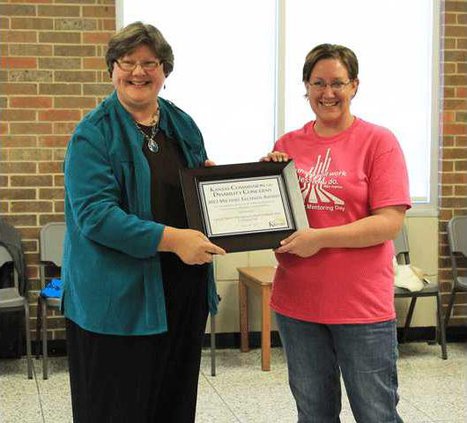“Nothing will work unless you do.”
The quote by poet Maya Angelou emblazoned the hot pink t-shirts worn by more than 50 Great Benders with disabilities Wednesday morning, Oct. 10. On Sept. 12, Great Bend Mayor mike Allison proclaimed the day Disability Mentoring Day. The job seekers and students spent hours job shadowing at area businesses, gaining valuable insights into the work world, and challenging myths and fears about hiring people with disabilities.
“For employers, not only are there tax benefits to be gained by hiring the disabled, they also gain a very trustful, hard working employee,” said Jennifer Welsch, Community Employment Specialist at Sunflower Diversified. The Great Bend non-profit helps people with disabilities learn important job skills and training in the employer expectations and how to get along with co-workers in the workplace.
Others dedicated to helping pave the way to self-sufficiency through employment were on hand to help make the day a success. They included Gwen Caro, Director of Development at Rosewood Services; Leslie Brown, Employment Specialist at Rosewood Services; and Janet Thurow, GBHS Special Education teacher and member of the Barton County Transitional Council.
“Employment makes people happy and healthy,” Caro said. “Our Rosewood clients will go through the application process following the mentoring process, and some may even find jobs from this opportunity.”
Mentoring program participants had a wide range of disabilities with learning, intellectual, physical or mental health. Some had disabilities in more than one category. The included transitional students from age 14 to 21, as well as adult job seekers. Prior to the event, each pinpointed a type of job they would like to explore, and Welsch, Caro, Brown and Thurow went to work lining up mentors at places like Applebees, Marmie Motors, Walmart, the police and fire departments, Countryside Vet, Chad Ohnmacht DDS, and other restaurant and retail businesses. One employer has worked with both Sunflower Diversified and Rosewood Services repeatedly over the years, and spoke to the mentees at the lunch following their job shadowing.
Employment lifts lives
“I don’t like the word disabilities,” said Nita Reimer with Central Kansas Custom Upholstery. “I like the term special needs. Everyone has abilities.”
Growing up, she was surrounded by relatives with special abilities. Her uncle was handicapped and her brother was diagnosed with mental disabilities, she said. Her mother was blinded in one eye and had partial paralysis.
“I didn’t even realize she was disabled until I was an adult,” she said. “Growing up, they did everything they were supposed to.”
Reimer hired Ronnie Lewis, a Sunflower Diversified client, seven years ago. Charles Bortz, a Rosewood client, is her second employee with special needs. He’s been with the company for seven months. Both work part-time, charged with multiple jobs.
She expects them to do what everyone else does. The list of tasks is long and diverse: stitch pillows, cut and bind carpet, cut foam, tear down furniture, put furniture back together, run heat press, run embroidery machine, help with inventory, input tickets on the computer, answer phones, take payments and operate the credit card machine. They get help, just like her two other full-time employees, Reimer said.
“In our shop and in our business everyone is always learning,” she said. “They’ll master a skill, but if they don’t do it for awhile, we need to go over it again. We have to do that with anybody. We show them, let them attempt it, and if they make a mistake, we can fix it.” Making mistakes is something they see “normal people” do as well, and Reimer makes certain not to berate them when they make one. Its the one fear she sees the two have, and she believes it’s because that is how they’ve been treated elsewhere.
Michael Lechner Advocacy Award
The Kansas Commission on Disability Concerns presented Welsch, the coordinator of the Great Bend Disability Mentoring Day (DMD) Committee, along with the entire DMD committee, the Michael Lechner Advocacy Award for their work on coordinating activities for the day. Commission Executive Director Martha Gabehart presented the award at the luncheon following the mentoring sessions.
“It is with great pleasure that we present the Great Bend DMD Committee with this award,” Gabehart said. “Their committee is making an impact in the Great Bend community to reduce barriers to employment for people with disabilities.”
The Michael Lechner Advocacy Award is named after the late, former commission executive director whose advocacy activities had far-reaching results in improving independent living opportunities for Kansas with disabilities.
“The disabled are a large, untapped market of potential employees,” Caro said.
DMD participants bring the pink
Committee receives Advocacy Award





